Santa Maria Gloriosa dei Frari
The Basilica di Santa Maria Gloriosa dei Frari, usually just called the Frari, is a church located in the Campo dei Frari at the heart of the San Polo district of Venice, Italy. One of the most prominent churches in the city, it has the status of a minor basilica. The church is dedicated to the Assumption of Mary.
.jpg)
The imposing edifice is built of brick, and is one of the city's three notable churches still mostly retaining their Venetian Gothic appearance. In common with many Franciscan churches, the exterior is rather plain, even on the front facade. The interior is notable for many very grand wall monuments to distinguished Venetians buried in the church, including a number of Doges and the painter Titian. Many of these are important works in the history of Venetian sculpture, and the many paintings include two large and important altarpieces by Titian, the Assumption of the Virgin on the high altar and the Pesaro Madonna. It also contains the only rood screen still in place in Venice.
History
.jpg)
In 1231, under Doge Jacopo Tiepolo, the city donated land at this site to establish a monastery and church belonging to the Franciscan Order of Friars Minor. This edifice proved too small and a three nave church was begun in 1250, and not completed until 1338. Work almost immediately began on its much larger replacement, the current church, which took over a century to build. The new church inverted the original orientation, thus placing the facade facing the plaza and small canal. The work was started under Jacopo Celega, but completed by his son Pier Paolo. The campanile, the second tallest in the city after that of San Marco, was completed in 1396. Under the patronage of Giovanni Corner, the Chapel of San Marco was added in 1420. In 1432-1434 the bishop Vicenza Pietro Miani built the chapel of San Pietro next to the bell-tower. The facade was not completed until 1440, with the cornice is surmounted by three statues (1516) by Lorenzo Bregno The main altar was consecrated in 1469. In 1478, the Pesaro family commissioned a chapel in the apse. On 27 May 1492, the church was consecrated with the name of Santa Maria Gloriosa.
The Frari is a parish church of the Vicariate of San Polo-Santa Croce-Dorsoduro. Other churches of the parish are San Barnaba, San Ludovico Vescovo, Santa Maria del Soccorso and Santa Margherita. The Franciscans had been expelled from the church during the 19th century, the church was restored to the order in 1922.
Titian, the most prominent 16th-century Venetian painter, is interred in the Frari.
Interior plan
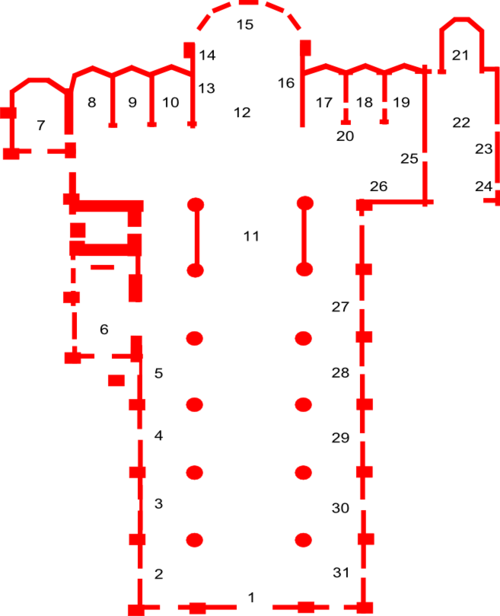
- - Counter-facade
- - Chapel of the Crucifix
- - Canova Monument
- - Doge Pesaro Monument
- - Chapel with Pesaro Madonna by Titian
- - Chapel of San Pietro
- - Chapel of San Marco
- - Chapel of the Milanesi
- - Chapel of San Michele
- - Chapel of the Franciscan Saints
- - Choir and Organ
- - Presbitery
- - Doge Tron Monument
- - 12th-century Crucifix
- - Assumption of Virgin, main altarpiece by Titian (and main organ)
- - Monumento al Doge Foscari
- - Chapel of San Giovanni Battista
- - Chapel of Father Kolbe
- - Chapel of Bernardo
- - Dead Christ
- - Altar of the Sacristy with Giovanni Bellini's Frari Triptych
- - Sacristy
- - Altar of the Relics
- - Entry to Sala del Capitolo and Convent
- - Wall of right transept
- - Jacopo Marcello Monument
- - Altar of Santa Caterina
- - Altar of San Giuseppe da Copertino
- - Altar with Presentation of Jesus at the Temple
- - Titian Monument
- - Altar of Sant'Antonio da Padova
Works of art
_nave_left_-_Altar_of_Madona_di_Ca'Pesaro.jpg)
- Assumption of the Virgin by Titian
- Titian, Pesaro Madonna on the north wall of the nave
- Antonio and Paolo Bregno, tomb of Doge Francesco Foscari in the chancel (attributed; may actually be by Niccolò di Giovanni Fiorentino)
- Lorenzo Bregno, tomb of Benedetto Pésaro above the sacristy door
- Girolamo Campagna, statuettes of St. Anthony of Padua and St. Agnes on the water stoups in the nave
- Marco Cozzi, choir stalls in ritual choir
- Donatello, figure of St. John the Baptist in the first south choir chapel, Donatello's first documented work in Venice
- Tullio Lombardo, tomb of Pietro Bernardo on the west wall (attributed; may actually be by Giovanni Buora)
- Antonio Rizzo, tomb of Doge Niccolò Tron in the chancel
- Jacopo Sansovino, damaged figure of St. John the Baptist on the font in the Corner Chapel
- Palma il Giovane, Martyrdom of St. Catherine from Alexandria / Martirio di santa Caterina d’Alessandria (1590-1595)
- Paolo Veneziano, Doge Francesco Dandolo and His Wife Presented to the Virgin by Ss. Francis and Elizabeth in the sacristy
- Alessandro Vittoria
- Giambattista Pittoni, Hagar in the desert, Oil on Canvas, sacristy
- Bartolomeo Bon's workshop, figures of the Virgin and St. Francis on the west front
- figure of The Risen Christ on the west front
- figure of St. Jerome on the south wall of the nave
- Alvise Vivarini, St. Ambrose and other Saints in the north transept chapel, his last work
- Bartolomeo Vivarini
- St. Mark Enthroned in the Capella Corner in the north transept
- Madonna and Child with Saints, altarpiece in the third south choir chapel
_-_Sacristy_-_triptych_by_Giovanni_Bellini.jpg) Giovanni Bellini, Madonna and Child with Ss. Nicholas of Bari, Peter, Mark and Benedict
Giovanni Bellini, Madonna and Child with Ss. Nicholas of Bari, Peter, Mark and Benedict_-_Chapter_Room_-_Hagar_in_the_Desert_by_Giovanni_Battista_Pittoni.jpg) Giambattista Pittoni, Hagar in the desert
Giambattista Pittoni, Hagar in the desert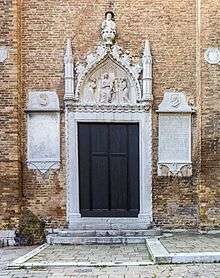 Bartolomeo Bon the Virgin and St. Francis on the west front
Bartolomeo Bon the Virgin and St. Francis on the west front_-_Tomb_of_doge_Francesco_Foscari.jpg)
_right_transept_-_Monument_to_Benedetto_Pesaro.jpg) Lorenzo Bregno tomb of Benedetto Pésaro
Lorenzo Bregno tomb of Benedetto Pésaro_nave_left_-_Statue_of_St.Antony_by_Girolamo_Campagna_1609.jpg) Girolamo Campagna,St Anthony of Padua
Girolamo Campagna,St Anthony of Padua_nave_right_-_Statue_of_Saint_Agnes_by_Girolamo_Campagna.jpg) Girolamo Campagna, St Agnes
Girolamo Campagna, St Agnes_-_Coro_dei_Frati.jpg) Choir stalls by Marco Cozzi
Choir stalls by Marco Cozzi_Cappella_di_San_Giovanni_Battista_-_San_Giovanni_Battista_di_Donatello.jpg) Donatello, St. John the Baptist
Donatello, St. John the Baptist_interior_facade_-_Monument_to_Pietro_Bernardo_by_Tullio_Lombardo.jpg) Tullio Lombardo, tomb of Pietro Bernardo
Tullio Lombardo, tomb of Pietro Bernardo_-_Tomb_of_doge_Niccol%C3%B2_Tron.jpg) Antonio Rizzo, tomb of Doge Niccolò Tron
Antonio Rizzo, tomb of Doge Niccolò Tron_Chapel_Corner_-_Statue_of_St._John_the_Baptist_by_Jacopo_Sansovino.jpg) Jacopo Sansovino, St. John the Baptist
Jacopo Sansovino, St. John the Baptist_nave_left_-_Altar_of_Madona_di_Ca'Pesaro.jpg)
_-_Main_altar.jpg) High altar showing Assumption of the Virgin by Titian
High altar showing Assumption of the Virgin by Titian_-_Chapter_Room_-_Monument_to_Doge_Francesco_Dandolo_-_Doge_Francesco_Dandolo_and_his_Wife_Presented_to_the_Madonna_by_Paolo_Veneziano.jpg) Paolo Veneziano, Doge Francesco Dandolo and His Wife Presented to the Virgin by Ss. Francis and Elizabeth
Paolo Veneziano, Doge Francesco Dandolo and His Wife Presented to the Virgin by Ss. Francis and Elizabeth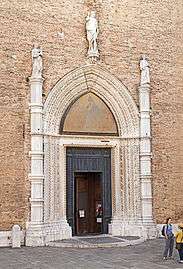 Alessandro Vittoria The Risen Christ
Alessandro Vittoria The Risen Christ_nave_right_-_Altar_of_san_Giuseppe_da_Copertino_-_St.Jerome_by_A.Vittoria.jpg) Alessandro Vittoria St. Jerome
Alessandro Vittoria St. Jerome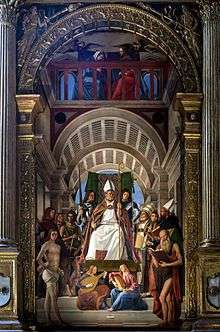 Alvise Vivarini St. Ambrose and other Saints
Alvise Vivarini St. Ambrose and other Saints_Cappella_Corner_-_Pala_di_San_Marco_by_Bartolomeo_Vivarini.jpg) Bartolomeo Vivarini St. Mark Enthroned
Bartolomeo Vivarini St. Mark Enthroned_-_Cappella_Bernardo_-_Polyptych_by_Bartolomeo_Vivarini.jpg) Bartolomeo Vivarini Madonna and Child with Saints
Bartolomeo Vivarini Madonna and Child with Saints
Funerary monuments
- Francesco Barbaro (1390–1454) (humanist and senator)
- Pietro Bernardo (d. 1538) (senator)
- Antonio Canova (only his heart is buried here; the tomb, realised by his disciples, is based on the drawing of Canova himself for an unrealised tomb for Titian)
- Federico Corner
- Doge Francesco Dandolo (in the chapter house)
- Doge Francesco Foscari (d. 1457)
- Jacopo Marcello
- Claudio Monteverdi (one of the greatest composers of the 17th Century)
- Beato Pacifico (founder of the current church)
- Alvise Pasqualigo (d. 1528) (Procurator of Venice)
- Benedetto Pésaro (d. 1503) (general)
- Doge Giovanni Pesaro
- Bishop Jacopo Pésaro (d. 1547)
- Paolo Savelli (condottiere) (the first Venetian monument to include an equestrian statue)
- Titian (d. 1576) (Renaissance painter)
- Melchiorre Trevisan (d. 1500) (general)
- Doge Niccolò Tron
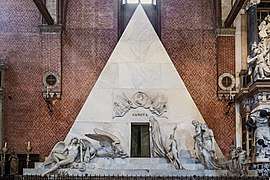 Monument to Antonio Canova
Monument to Antonio Canova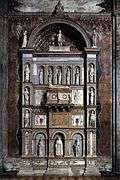 Monumento to Doge Niccolò Tron
Monumento to Doge Niccolò Tron_Cappella_Corner_-_Monument_to_Federico_Corner.jpg) Monument to Federico Corner
Monument to Federico Corner_-_Chapter_Room_-_Monument_to_Doge_Francesco_Dandolo.jpg) Monumento to Doge Francesco Dandolo
Monumento to Doge Francesco Dandolo_right_transept_-_Monument_to_Jacopo_Marcello_by_Pietro_Lombardo.jpg) Monument to Jacopo Marcello
Monument to Jacopo Marcello_Cappella_dei_milanesi-_tomb_of_Claudio_Monteverdi.jpg) Tomb of Claudio Monteverdi
Tomb of Claudio Monteverdi_right_transept_-_Monument_to_Blessed_Pacifico_Dei_Frari.jpg) Monument to Blessed Pacifico
Monument to Blessed Pacifico_interior_facade_-_Monument_to_Alvise_Pasqualigo.jpg) Monument to Alvise Pasqualigo
Monument to Alvise Pasqualigo_nave_left_-_Monument_to_Doge_Giovanni_Pesaro.jpg) Monument to Doge Giovanni Pesaro
Monument to Doge Giovanni Pesaro_nave_left_-_Monument_to_Jacopo_Pesaro_1524.jpg) Monument to Jacopo Pesaro
Monument to Jacopo Pesaro_right_transept_-_Monument_to_Paolo_Savelli.jpg) Monument to Paolo Savelli
Monument to Paolo Savelli_nave_right_-_Monument_of_Titian.jpg) Monument of Titian
Monument of Titian_nave_right_-_Monument_to_Almerico_d'Este.jpg) Monument to Almerico d'Este
Monument to Almerico d'Este_Cappella_di_san_Michele_-_Monument_to_Melchiorre_Trevisan.jpg) Monument to Melchiorre Trevisan
Monument to Melchiorre Trevisan
External links
| Wikimedia Commons has media related to Santa Maria Gloriosa dei Frari (Venice). |
- Official website (in Italian)